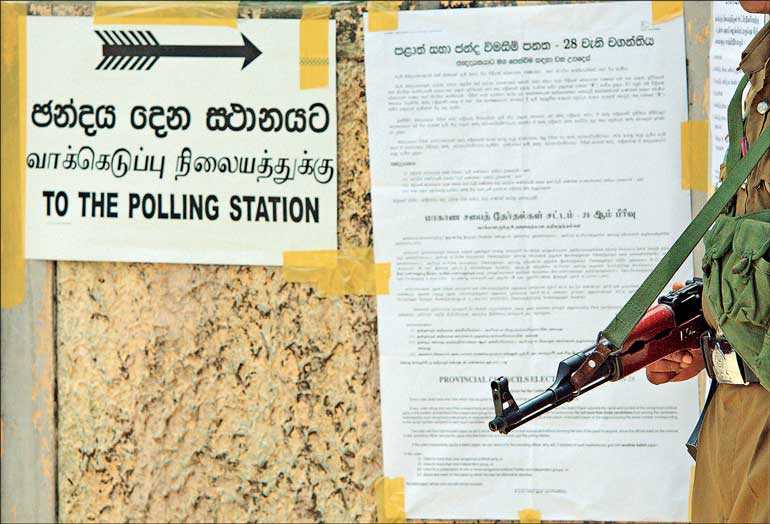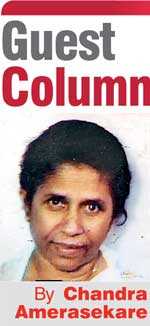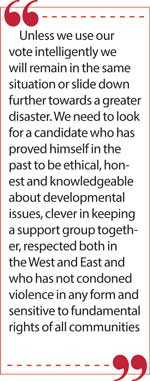Saturday Feb 21, 2026
Saturday Feb 21, 2026
Friday, 19 July 2019 00:00 - - {{hitsCtrl.values.hits}}

After the recent terrorist attacks and the subsequent violence unleashed against innocent Muslims by racists, Sri Lankans are searching for a leader who can save the country. Many have lost faith in the leaders, due to the breakdown in the security and administrative systems in the country and our society in general, due to political interference, deceit, corruption and lawlessness.
breakdown in the security and administrative systems in the country and our society in general, due to political interference, deceit, corruption and lawlessness.
Some say only a dictator or an autocrat could save this country. Some even suggest that the powerful ex-Secretary of Defence under the previous regime should be given the top post. To agree with this view and accept it as the need of the hour or to reject it, we need some criteria to decide what type of individual would be suitable for the presidency. If we could identify what we Sri Lankans want individually and as a country in the present situation, it will help us to consider some criteria to select the best person.
Let us assume that as a country as well as individuals, we want security with individual freedom, peace, social stability through law and order and communal harmony. Moreover, we want economic stability through sustained economic growth and income distribution and an end to corruption.
If these are our aspirations, then we have to reject leaders who do not have the capability to give leadership to (a)maintain an efficient defence/security system to provide security, (b) maintain law and order in a manner that ensures safety and orderliness in society while protecting fundamental rights of individuals, (c) assure the independence of the Judiciary, (d) eliminate corruption(e)develop the economy to bring about a balanced and sustained growth by bringing in foreign aid, investments as well as implementing viable and environmentally feasible projects within a prudent fiscal and monetary policy frame work. Is it possible to expect all the above from dishonest, lying, power-hungry politicians?
Political interference
Recent revelations have shown how political leadership had interfered with the efficient working of the Security Council and the Police to suit their personal agenda which led to the breakdown in our defence mechanism. Hundreds of innocent people lost their lives as a result. Perhaps public officers helplessly watched this treachery taking place and ultimately became scapegoats or they reciprocated by being indifferent to what was taking place.
Now we know how political interference in the working of government mechanisms and systems could destroy us. In this context, when selecting a president, is it sufficient to consider only the strength of the candidate to do what he desires whether it is right or wrong, or should we give more emphasis to a person’s character, background and education?
Power corrupts and absolute power corrupts absolutely. A very strong man without principles, integrity or a sense of justice, if given all the powers, could use his power to take away our individual safety and freedom, make the whole country unstable and end up as an empire builder who suppresses dissent ruthlessly.
What we should look for in the first place is not whether a person is strong, but his ethics, integrity and honesty. A person of ethics and integrity will not abuse his power. Of course we need to be careful in believing individuals who suddenly profess to be ethical and honest if that person has condoned acts of violence and hatred before. Such a person could pretend to be good to take advantage of the opportunity presented before him to get into power. There is truth in the old adage that even if the forest is different, the tiger’s spots remain.
It is essential to look at the personal qualities and the past of a candidate more closely. Anyone who is too quick to blame others for failures, habitually attribute the credit gained from a collective effort primarily to himself cannot lead a team and work with subordinates smoothly. The reasons for this are, he is interested in himself and not the country and he lacks the ability to convince and win the confidence of others. He resorts to force, terror tactics and overlooks corruption of subordinates to get their cooperation for his own survival. 
This does not mean all strong men should be ruled out from this race. A strong man, if ethical and just, could be like another Lee Kuan Yew or Gandhi or Nelson Mandela. A person’s past shows how ethical he or she is. What we need is a person who has displayed integrity, fairness and honesty during his public life and who has not condoned racism and violence.
Beware of proclamations
Sri Lankans need to be careful about accepting and believing proclamations or declarations made by individuals when deciding whom to vote. Very often politicians make these proclamations or declarations to suit the emotional thinking of the voters. They identify the sensitive reactions of the different groups of voters, and make appropriate declarations that appeal to the voter’s sentiment. This is what is called ‘nile allala gahanawa’ in Sinhala.
For example, Sinhalese Buddhists, though tolerant by nature, could be fierce protectors of their religion and culture. Knowing this tendency, unscrupulous politicians could use their support groups consisting of yellow-robed men or thugs in imported denims, to create a situation to convince the unsuspecting Sinhalese Buddhists that Buddha Sasana and the Sinhala race are threatened by a minority or by another political party. There will be a positive reaction by Sinhalese Buddhists who will rush to rally round the leader who makes a proclamation like “I will risk my life to protect the Sasana.”
Most Buddhists will not stop to think that such an approach will only divide the people leading to conflict and not the protection of the Sasana. This is how we saw broken Buddha statues and burning Muslim shops in our country.
Some politicians are fond of identifying themselves with the poor even though they live in the lap of luxury. A declaration like “I will stop corruption the moment I am elected President” will be very appealing to all.
Trade agreements and sovereignty
A bogey used often by politicians with regard to trade agreements, foreign-funded consultants is to scare the public by declaring ‘Sri Lanka’s sovereignty will be lost’. Often this kind of bogey is brought out to scare the public when something good is done by the opposite party.
In the past, government ministries, departments and research institutions had both foreign and local consultants paid from foreign funds coming from governments or international agencies under technical assistance or capital aid projects. That is one way transfer of technology takes place in the world. They were not foreign agents, but specialists employed by the Government and reporting to the local boss. The foreign consultants had limited immunity (to avoid double taxation, etc.), foreign passports and ID as they were foreign nationals. If they are considered as foreign agents, we would have lost our sovereignty a very long time ago!
International agreements are normally signed after careful consideration of the pros and cons by the relevant ministries and the Cabinet. Consultants and legal officers in the departments/ministries assist in formulating and scrutinising the agreement. Then it has to be approved by the Cabinet.
The negotiating team consists of officers of the relevant ministries. Finally Parliamentary approval is also necessary for important agreements. It is very unlikely that anything that will compromise the sovereignty of the country will escape the eyes of all the people who got involved in this process. There is a provision in an agreement for the two parties to the agreement to withdraw from it if necessary.
Sometimes a trade agreement could be disadvantageous to a particular group. Such is the case when an agreement opens the door for foreign doctors to practice in Sri Lanka, and the GMOA opposes it. This can be justified only if we have an excess of doctors in Sri Lanka. Otherwise such objection is only an attempt to obliterate the greater benefit to the country to suit selfish insecurities.
Therefore, we should not take only the face value of these declarations. We should examine the established evidence. For example, a very honest person without past experience in building and managing a movement or an entity may not be able to do what we expect, unless he has a reputed, efficient, experienced team to handle all sectors of governance. Without such a following, the first few years will be spent learning his job! Then again a team leader can hardly persuade others to work towards a goal unless he has the convincing power and other leadership qualities to motivate others to do what he wants. This is why an honest leader from an established party has better chances of being a good president.
Validity and feasibility of sweeping statements
We need to think about the validity and feasibility of these sweeping statements made by candidates. The capacity of the president and the prime minister to enforce discipline and insist on integrity within the group or party, depends on whether they have a comfortable majority in Parliament. Of course without a comfortable majority in Parliament one cannot expect this to happen and our aspirations may not be fulfilled.
Without a comfortable majority in parliament the president and prime minister will be more concerned about their own survival more than ours. They will succumb to the dictates of minority groups in Parliament for their survival. Hence, it is important to consider whether a candidate has a strong party that can win the parliamentary elections with a comfortable majority.
When it comes to social stability and personal security, no person who directly or indirectly, exploits religious and racial differences to create hatred and suspicion among communities to grab power, can create social stability through communal harmony and assure personal safety to the people. We Sinhalese do not have a super right to the country. Every citizen of this country has an equal right to this country legally and ethically. We can never live in peace by destroying the peace and dignity of the minorities. We need to respect others’ rights and dignity for them to respect ours.
Some politicians in Sri Lanka oppose racist behaviour in public, but secretly use their support groups to use racism, religion or any other divisive issues to rile emotions against other communities or groups to grab votes. Such leaders destroy peace and individual safety by creating hatred among communities.
That is how extremism and terrorism originate. Communal and religious hatred is spread indirectly by these politicians. The public continues to support them without realising that they are being deceived. Only a person with proven integrity and who does not condone racist behaviour by the supporters could bring the Sri Lankan society together and establish peace and social stability.
Educational qualifications
Is a degree necessary to be a good president? The capacity of a presidential candidate to deliver what we expect depends to a large extent on his level of education which could be formal or informal. Level of education is often used as a yard stick in measuring the mental capacity and level of discipline of a person. One could argue that a high level of education is not required to be an efficient leader, but intelligence and common sense are more important. We tend to agree with this when we see some highly-educated people show behaviour not exactly ethical or intelligent.
Some of the most capable leaders in the world were not successful students. Doors of universities were closed to Sir Winston Churchill as his performance in school was poor. But he became one of the greatest prime ministers of Britain. Our Sirimavo Bandaranaike, educated up to eighth grade, was respected the world over for her efforts to bring together a group of countries that formed the Nonaligned Group. Countries in both the West and East rushed to send aid when the first JVP uprising occurred, proving the popularity of Sirimavo as a nonaligned leader. Informal education received through experience, training and reading plus intelligence, is considered as equal to formal education.
Economic stability and growth
The president or the prime minister we elect should have the ability to achieve economic stability and growth for the people to have a comfortable life. The voter needs to look for his ideas about how he is going to bring development.
We must not be driven by short-term offerings like price reductions only. More jobs, better income from agriculture and fisheries, better schools, access roads and clinics in the villages are more important for the majority. We need to look at their election manifesto to see whether these concerns are addressed in it.
Economy can be considered stable and growing if all the economic indicators such as the gross domestic product (total production of goods and services in the country), per capita income (income per person), balance of payment(balance in all international trade and financial transactions of the country), access to basic needs, growth rate, inflation etc. indicate a steady improvement. However, even when such indicators are positive, they may not indicate real economic growth and stability in the long term. This is due to the reason that in the calculation of these indicators the end result depends on what goes into the calculation.
For example, in the calculation of GDP, if 90% of the value that goes into the calculation comes from the construction industry, it means there was hardly any production in agriculture, fisheries, exports and other sectors, which impact the day today life of the people. In such a situation even though the GDP growth rate has increased, the income of the people remains the same or worse. On the other hand, such an increase in GDP could have caused other serious problems for the country, like a debt trap.
Poor countries like Sri Lanka have to depend on foreign capital (funds) and technology to implement projects such as huge irrigation systems, roads, harbours, airports and industries. If the capital for these projects came not as grants or concessionary loans, but commercial loans at high interest rates with short periods of repayment, country would end up in a debt trap, unless the income from the projects is available to pay back the loan. Otherwise we have to dip into the money set apart to import food and medicine, capital goods and raw material required to keep other projects going, in order to meet the loan repayments. When we fail to meet loan commitments it drives away investors.
Demands for funds from International financial institutions like the World Bank, ADB, and IMF come from other low and middle income countries too and these institutions do not fund projects that do not give any return on investment. Therefore, unless a government has the correct priorities and borrows money wisely, the country could fall into a debt trap, create a debt burden for generations to come and we may not have food security.
A leader who is driven by vanity will resort to giving more emphasis to projecting his image than building the country for the benefit of the masses. As a result we could have a situation where the country is richer with new buildings and roads that change the landscape and bring pleasure to a few. It gives the impression of growth. In reality to what extent has this contributed to the indebtedness of the future generations, to the welfare of a majority of citizens who live in poverty or near poverty?
Therefore, for real economic growth, we need to elect individuals who are likely to have the wisdom, experience, and inclination to manage the economy prudently and the ability to command the respect and trust of all the lending countries and international institutions. We need to see whether the candidate is the image building type or has a clear idea about how to make the economy grow without further marginalising the poor. Such a policy would have plans to develop agriculture, fisheries and exports as priorities as the majority of the poor are engaged in these sectors.
Unless we use our vote intelligently we will remain in the same situation or slide down further towards a greater disaster. We need to look for a candidate who has proved himself in the past to be ethical, honest and knowledgeable about developmental issues, clever in keeping a support group together, respected both in the West and East and who has not condoned violence in any form and sensitive to fundamental rights of all communities.